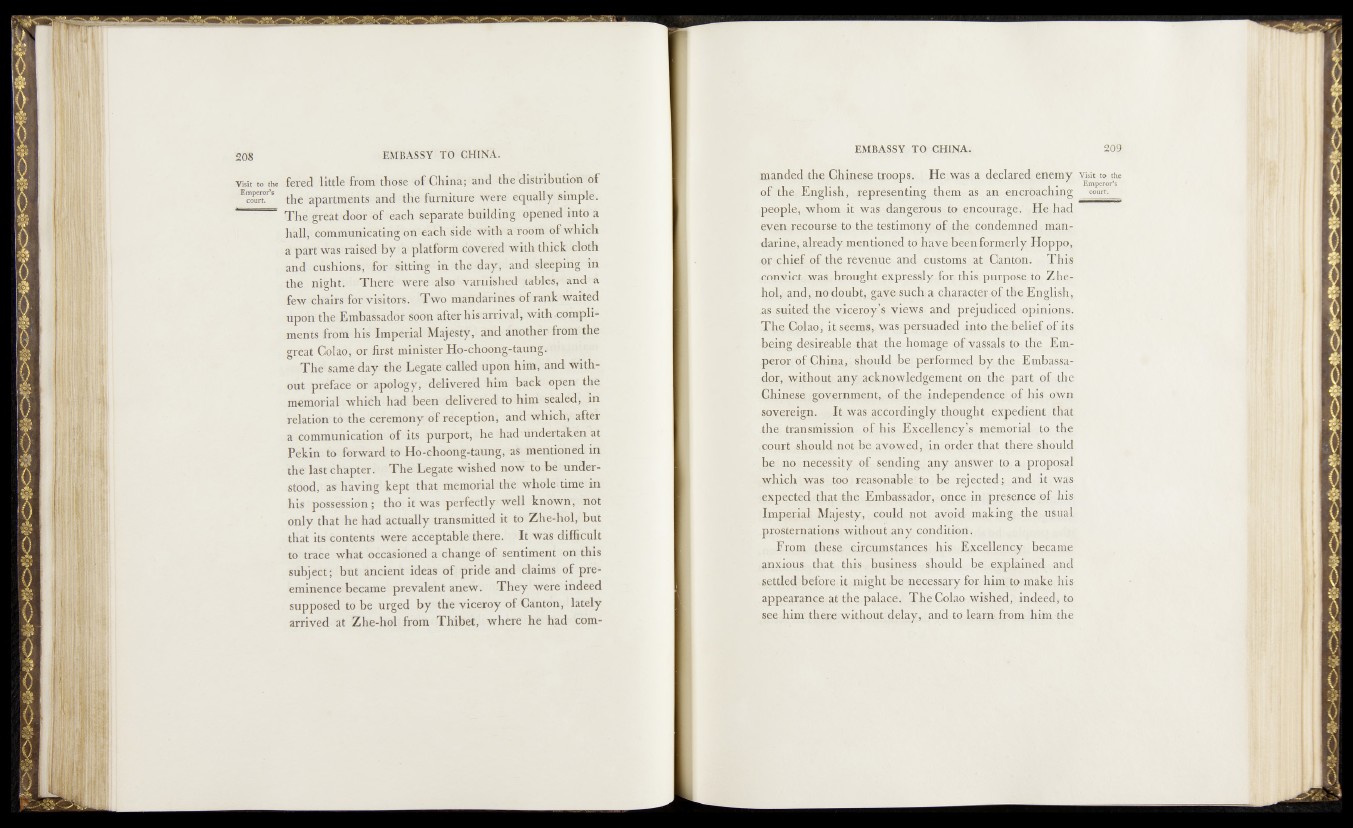
-Visit. to the
Emperor’s
court.
fered little from those of China; and the distribution:'Of
the apartmentsi’ând the furniture -were equally «impie-.
The great door Of each separate building. opened into a
hall, communicating G n each side wi|h aro o rn p f which
a part was raised b y ! a platform eoveifed 'with thick cloth
and cushions, for sitting in the day, and steeping in
the nightp TheièW ^ e re also Yarnished tables,* *€ftd< a
few chairs for visitors. Two mandarines of rank waited
upon the Embassador soon after his arrival, with compliments
from his Imperial Majesty,' and another from the
great Colao, or first minister Ho-choong-taung.m
. The same day the Legate called upon him, -and without
preface or apology, delivered him back open- tlfP
memorial which had been -delivered to him' sealed*, in
relation to the ceremony of reception, andi#hfi^^i§tfer
a communication of its purport, he had undertaken at
Pekin to forward to Ho-choong-taung, a£ mentioned^ip
the last chapter. The Legate wished now to.be understood,
as having kept that memorial the whole.time in
his possession ; tho it was perfectly well known, not
only that he had actually transmitted it to Zhe-hol, but
that its contents were acceptable there. It was difficult
to trace what occasioned a change of sentiment on this
subject ; but ancient ideas of pride and claims of preeminence
became prevalent anew. They were indeed
supposed to be urged by the viceroy of Canton, lately
arrived at Zhe-hol from Thibet, where he had commandedAtl^;
Qjines,e trpops> I Hejwas.a declared enemy
of itfie^English, ; representing jthem-gs .an ep^achjng
(peqplpyf^hom it yfas^dangerous tq«y|gmi^agQi' He had
e^pj-reepurse^ to the .tepjmqnjy ,d£(t m a n darine,
already mentioned teM&ye|bepn|f(II’Iperly Hoppo ,
or chief of the revenue * T||$
Gqpyict .was brought expressly,fonthis-,pupposje^tp Z f t
hpl^andj no doubt,^gajye-suchta, chayaptepof,the English,
.aysuited^the -vipegew^yiews and, prejudiced-jopinion^.
T h e Qglaqi its|erniS>,i3Yas p^rsuadgjcl ,int(o the{b%l<i]eJLg£ its
being^desk^|blp &tha;t. theghpmgffje-pfiyas^afs Jo^tMe.EiPr
peror^f Tilling.,. sl^ppM be g^fogmed b y .the, , Embasjsar
dor, without anyyapknq\yIigd^ment on Lhe,,p.ajt of the
Chinese, goy^rnment, of the,independence his,
sovereign. It.was aycqrdingiy thought expedient; that
the, transmission ’s ; mpmofiah An the
.court shouldnot be avojyqd|, in j^d*eiy h,at, sbmfjd
he no. necessity gfH sending any pisyvejytp a.prppqsgjl
wh,ich .was jtpo£ reasonablejto be r,ejeGte.4jj|. and^jitjAyaS
expected, that the Embassador, once in . presenjej;p£this
Imperial Majesty, j could not;
prosternatioqs without an y cgnditfpn-;.;|
51. From thesp, )oiroiimstances; his j b ^ a > m §
anxious;... that this business-,-sjipuld _ be; .e^plain^dvand
.seftledib^oredt.'might -bpjnecpssary for hiintp make his
appearance at the, pajaepy The Colao .wished^ .indeed;,.to
see him there witbovttdfday,| and to learn,from hito the
Visit to the
Emperor’s
court*